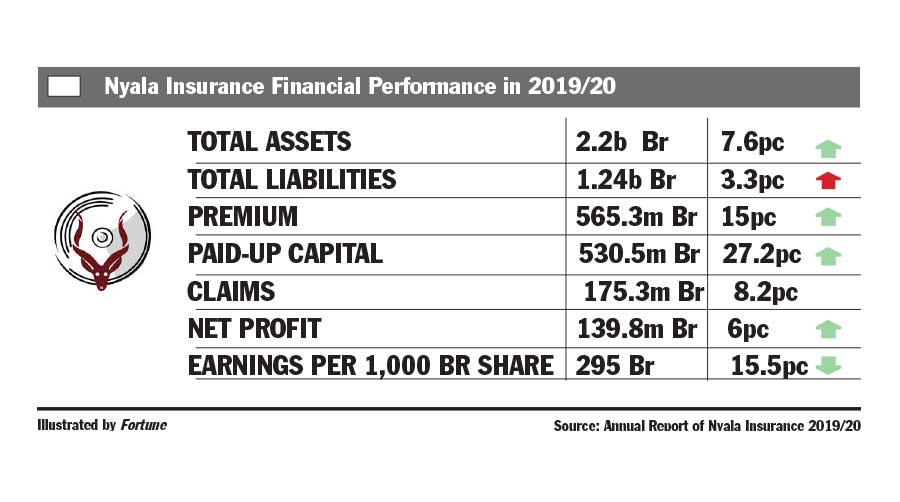
Commentaries | Oct 12,2019
The capital market is expected to see substantial growth in size and investment over the next four years, contingent on favourable macroeconomic conditions and successful policy implementations, according to a market size estimation study published by the Ethiopian Capital Market Authority (ECMA). The study, titled "Potential Market Size Estimation & Projection for the Developing Ethiopian Capital Market," was prepared by economists Tewodros Mekonnen Gebrewolde (PhD) and Getachew Ahmed Abegaz. It provides an in-depth analysis of Ethiopia's capital market potential by 2028, examining key macroeconomic variables such as GDP, national and financial savings, interest rates, and inflation rates to assess prospects for the country's debt and equity markets.
The study outlines three scenarios for the future of Ethiopia's capital market. According to Tewodros, the baseline scenario assumes no consequential policy changes, while the other two envision different outcomes based on varying economic conditions. The second scenario, which projects the most growth, relies on the successful implementation of reforms like the Home-grown Economic Reform (HGER) 2.0 plan, an improved investment and trade climate, macroeconomic stability, and increased productivity. Conversely, the third scenario assumes economic setbacks due to internal or external shocks, such as fuel price hikes, natural disasters, or intensified conflicts, which could hinder the development of the capital market.
All three scenarios predict an increase in national savings, albeit at different rates. The second scenario projects national savings to reach 4.6 trillion Br, with a faster annual growth rate. This growth would reduce dependence on foreign debt, enable more public investment, and create a larger pool of resources for the capital market, potentially lowering costs and attracting a diverse range of investors.
"Economic growth over the last few decades has not been matched by stability," Tewodros told Fortune. "The pace and extent of growth depend heavily on the successful implementation of reforms aimed at achieving macroeconomic stability, improving the investment climate, and promoting financial inclusion."
He emphasised that long-term investment and savings require a well-functioning capital market to meet growing demand, supported by a favourable environment and effective policy implementations. Tewodros also underscored the importance of the floating foreign exchange market and other reforms as critical to enhancing the capital market.
The projection aligns with the National Bank of Ethiopia's (NBE) three-year strategy, which aims for a market-based monetary system focusing on price and financial stability, financial inclusion, digitisation, and strong governance. The NBE's measures to reduce inflation to 20pc by June 2024 and below 10pc by the following year include capping credit growth to 14pc of previous loan disbursement levels, limiting direct advances to the government to a third of previous levels, and raising the interest rate at the NBE’s emergency lending facility from 16pc to 18pc.
However, Tewodros cautioned that challenges remain. The current fiscal imbalance is a concern, with a declining tax-to-GDP ratio indicating that the government is not generating sufficient revenue to finance its spending, leading to heavy reliance on borrowing to fill the gap. However, he believes higher gross national savings envisioned under the second scenario could offer several economic benefits, including reduced dependence on foreign borrowing, increased government investment in infrastructure and public services, and overall economic growth and improved living standards.
The government's recent macroeconomic reforms are anticipated to contribute to the growth of the capital market through increased foreign direct investment and improved liquidity.
According to Yohannes Arega, a senior advisor and chief of staff at the Authority, the study provides a better understanding of the current market dynamics, ensuring a smooth transition by identifying potential risks and opportunities.
"It's a benchmark for measuring market performance, which can be used to track progress and make necessary adjustments to ensure the market develops as intended," he said.
ECMA has been preparing for the market's opening by developing regulatory frameworks and implementing new technologies. Yohannes said market surveillance system is nearing deployment, and several participants have already received licenses to operate.
"We are ready to launch," he told Fortune.
The historical background of Ethiopia's capital market dates back to 1960, when the State Bank of Ethiopia initiated share trading. This early progress was interrupted by the regime change in 1974, leading to the nationalization of companies and the dismantling of the share market. The current form of the ECMA began to take shape in 2021, with a team of 14 experts developing a 10-year implementation plan, outlining a roadmap that includes policy reviews, market infrastructure development, and capacity building.
Both state-owned enterprises (SOEs) and the private sector are expected to contribute to the growth of the debt and equity markets, potentially expanding investment opportunities and fostering economic development.
The projection indicates a disparity in the contributions to the capital market, with SOEs outpacing the private sector. In the second scenario, the SOE equity market, bolstered by increased spending and deeper financial markets, could reach 31 billion Br, while the debt market could grow to 338 billion Br by 2028. The private sector equity market is projected to reach 15 billion Br in the same scenario. The study estimates that financial savings could grow significantly, assuming the implementation of planned reforms and political stability, potentially reaching 1.5 trillion Br by 2028.
This substantial increase, representing an average annual growth rate of 29pc, would enhance market liquidity, reduce capital costs, and attract diverse investors, relying on the monetisation of the economy and a shift toward formal savings.
Ethiopian Securities Exchange (ESX) began its capital-raising activities last year, attracting interest from the private sector, including commercial banks and insurance companies. It exceeded its initial capital requirement, raising a subscribed capital of 1.51 billion Br and a paid-up capital of 800 million Br.
CEO Tilahun Kassahun emphasised the importance of total market capitalisation, a strong financial ecosystem, and accurate company valuations in driving the growth of the capital market.
"Company valuations are a key determinant," he said.
He noted that while state-owned enterprises are expected to play an important role, there is a growing desire for increased capitalisation from private participants rather than state-owned businesses. However, Tilahun pointed out that SOEs will likely dominate the debt market, where the government has traditionally issued treasury bills. He also noted the positive impact of the exchange rate unification, which will open the market to foreign investors.
"The reform was a necessary milestone," Tilahun told Fortune.
He revealed that ESX has completed building its infrastructure and has developed implementation teams, business plans, financial models, and risk management procedures in preparation for its launch in the coming months.
"We are on the right track," Tilahun said.
PUBLISHED ON
Sep 01,2024 [ VOL
25 , NO
1270]

Radar | Nov 27,2023

Radar | Jun 15,2024

Fortune News | Feb 27,2021

Sponsored Contents | Apr 05,2022

Commentaries | Apr 11,2020

Dec 22 , 2024 . By TIZITA SHEWAFERAW
Charged with transforming colossal state-owned enterprises into modern and competitiv...

Aug 18 , 2024 . By AKSAH ITALO
Although predictable Yonas Zerihun's job in the ride-hailing service is not immune to...

Jul 28 , 2024 . By TIZITA SHEWAFERAW
Unhabitual, perhaps too many, Samuel Gebreyohannes, 38, used to occasionally enjoy a couple of beers at breakfast. However, he recently swit...

Jul 13 , 2024 . By AKSAH ITALO
Investors who rely on tractors, trucks, and field vehicles for commuting, transporting commodities, and f...

Oct 25 , 2025
The regulatory machinery is on overdrive. In only two years, no fewer than 35 new pro...

Oct 18 , 2025
The political establishment, notably the ruling party and its top brass, has become p...

Oct 11 , 2025
Ladislas Farago, a roving Associated Press (AP) correspondent, arrived in Ethiopia in...

Oct 4 , 2025
Eyob Tekalegn (PhD) had been in the Governor's chair for only weeks when, on Septembe...